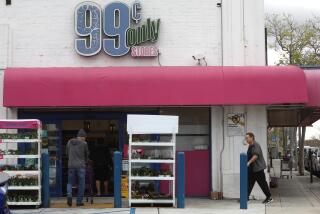Are Buyers of ‘Zombie’ Brain-Dead?
- Share via
The common stock of bankrupt L.A. Gear Inc., the once-highflying sneaker maker, is worthless. The company says so officially in the reorganization plan it filed in Bankruptcy Court a week ago.
But in the stock market, investors were paying 19 cents a share for L.A. Gear on Tuesday-- an 850% increase from the year-end price of 2 cents.
Does somebody know something that L.A. Gear management doesn’t? Or is this just woefully naive speculation on the part of some investors?
L.A. Gear is standing by its description of the stock’s value in the reorganization plan. The firm’s intention is to pay nothing to current common stockholders.
The new common stock that L.A. Gear would issue if the court approves the reorganization plan would go to current owners of the Santa Monica-based company’s preferred stock.
“Your guess is as good as ours” why anyone would be buying the existing common stock now, said an L.A. Gear spokesman.
The trading hasn’t been just peanuts. On Tuesday, volume was listed as 102,900 shares on the Nasdaq Bulletin Board, an unregulated electronic marketplace. On Jan. 14, a total of 1.27 million shares changed hands. The closing price that day: 10 cents.
It’s conceivable that the investors who were “short” the stock--betting it would fall--are buying it back to close out their positions. But why bother now, if the value is going to zero?
It’s also conceivable that some investors are betting that the court will reject the reorganization plan and order some payment to current shareholders.
But it’s tough to imagine that small investors--the principal players on the Nasdaq Bulletin Board--would have a good sense of the court’s views.
There are, nonetheless, three East Coast brokerages trading the stock on the bulletin board, thus facilitating individual investors’ purchases and sales.
*
What’s the brokerages’ motivation for making a market in a “zombie” stock?
“If people want to speculate and buy the stock, that’s their business,” said a trader at one of the brokers, Paragon Capital in New York. “There are speculators who figure, ‘If I lose 14 cents a share, I lose 14 cents a share.’ ”
Actually, the brokerages have a very good reason to make a market in a stock like this, when trading is active: The spread between the “bid” and “asked” prices on this stock is wide enough to fly the space shuttle through.
On Tuesday, L.A. Gear’s bid price was 15 cents while the asked was 19 cents. In other words, to buy the stock you’d have to pay 19 cents a share. But if you tried to immediately sell it back to one of the market makers, you’d get 15 cents--an instant loss of 21% to the investor and potentially a tidy profit for the brokerage.
To put that in perspective, the equivalent spread on a stock like Walt Disney, for example, would amount to about $22 a share: You would be buying Disney at $102.75, but if you sold you’d get about $81.
The brokers can argue that they need the spread on L.A. Gear nice and wide for themselves because, after all, the stock is probably worthless--so they’re taking a lot of risk holding any shares.
But then, why should a probably worthless stock be allowed to trade at all?
Well, the poor investors who bought the stock long ago--and have significant losses--may still be unloading shares to officially record their losses for tax purposes. They need a market in which to sell.
As for the buyers, the only thing we can say is, “Good luck.”
*
Tom Petruno can be reached at [email protected]
More to Read
Inside the business of entertainment
The Wide Shot brings you news, analysis and insights on everything from streaming wars to production — and what it all means for the future.
You may occasionally receive promotional content from the Los Angeles Times.










